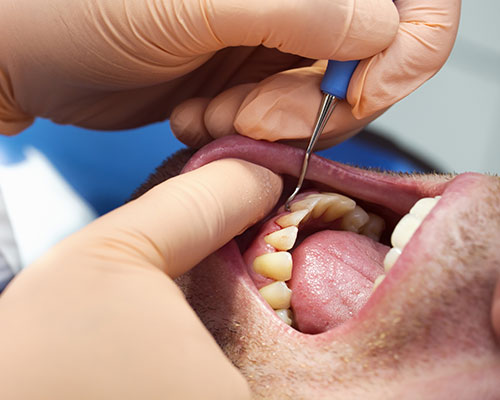If you have gum disease, or periodontitis, in Doncaster, your dentist may recommend periodontic treatment to reverse or control the symptoms. Periodontics is the field of dentistry concerned with treating the area around your teeth – and at Churchview Dental Practice we take this very seriously. Why? Because healthy gums are the key to healthy teeth and an attractive smile. At Churchview Dental Practice, we monitor the health of your gums during your regular dental check-ups, and will carry out any further periodontic treatments if required.
PERIODONTICS
Treating gum disease in Doncaster through a variety of proven methods
Periodontal treatment in Doncaster
Cleaning, advice and treatment in Doncaster
At Churchview Dental Practice, we aim not just to treat gum disease, but to educate too. Gum disease is still on the rise among adults in the UK, and tooth decay is being reported in children as young as four. It’s a shocking set of statistics with an alarmingly simple solution: practise good oral hygiene – daily brushing, flossing, a mindful diet and regular dentist check-ups – and you are unlikely ever to need the assistance of our periodontics team in Doncaster. If, however, treatment is required, your dentist will guide you through the procedures, which may include:
– Professional cleaning
– Antibiotics
– Assessment using a periodontal probe

FAQs
What is periodontitis?
Otherwise known as gum disease, periodontitis is the inflammation of the gums and supporting structures of the teeth. The early signs of gum disease are known as gingivitis, progressing to periodontitis as symptoms worsen. If you’ve ever heard the phrase ‘getting long in the tooth’, it’s a saying that unconsciously makes the connection between old age and receding gums – which ultimately lead to tooth loss. Look after your gums, and you won’t ever be described as ‘long in the tooth’!
What are the signs of gum disease?
Bleeding, swollen or sore gums, and constant bad breath, are all signs that you have gingivitis. This is reversible with a good – but long-term – cleaning routine.
How is periodontitis treated?
Treatments range from a scale and polish, to remove disease-causing plaque and tartar, to root planing, which involves cleaning under the gum line – an anaesthetic is required for this. In severe cases, surgery may be required to lift the gum for cleaning and reshape it for future protection. When gum disease is too advanced, tooth extraction is the only remaining option.
What should I do if I think I have gum disease?
The first thing to do is visit your dentist for a thorough check-up of your teeth and gums. The dentist can measure the ‘cuff’ of gum around each tooth to see if there is any sign that periodontal disease has started. X-rays may also be needed to see the amount of bone that has been lost. This assessment is very important, so the correct treatment can be prescribed for you.
What happens if gum disease is left untreated?
The consequences of not treating gum disease are serious. If the symptoms of swollen and bleeding gums are ignored, the gums can start to erode and the teeth will lose support and possibly fall out. This is known as periodontitis, a disease which can be controlled but not cured.

